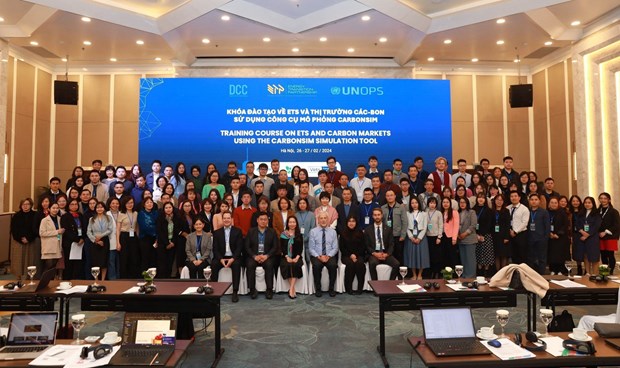 Environment
Environment

 |
| Associate Professor Nguyễn Thường Lạng, Lecturer of the School of Trade and International Economics under the National Economics University. Photo vov.vn |
Prime Minister Phạm Minh Chính has asked relevant agencies to urgently research and establish a national registration system for carbon credits to enable Việt Nam’s carbon market development project. Voice of Vietnam (VOV) asked associate Professor Nguyễn Thường Lạng about the issue.
In a recent decree, the Prime Minister emphasised the importance of developing a carbon credit market in Việt Nam. What is your assessment of this?
In order to establish financial sources to enable the net zero goal and take advantage of Việt Nam's advantages in this field, I believe that creating the carbon credit market is a crucial step. The instruction was released at an appropriate time although, in my opinion, it could have been issued sooner, as several other nations have already taken the same course.
Certain evaluations indicate that the carbon credit market in Việt Nam is expanding. We will lose out on opportunities if we don't keep up with the pace of this market and the cost of making up for lost time will be higher.
By expanding the market, we can connect the Vietnamese market with other nations, mobilise resources more efficiently and use market mechanisms—rather than Government decrees—to drive the process of reaching the net zero goal.
We will be able to use the market to regulate instead of relying on Government intervention.
The provision of carbon credits is a goal shared by many investors in industrial zones, as well as those in renewable energy sources like solar and wind power. How would you evaluate the chances of Việt Nam in establishing a market for carbon credits?
Everyone has realised that this market has the potential to be successful.
Organisations that possess the ability to offer these carbon credits ought to seize the chance to pursue financial gains, particularly marginal gains that are anticipated to rise.
Industrial parks, industrial clusters, and local areas have lots of potential (for example, forest potential), and we can then more strongly activate the credit market. By converting resources into capital, we can change the energy structure while also generating conditions for resource regeneration.
We can implement sustainable development goals on the basis of local and available resources, with minimal support from the State, especially from the budget.
What is our country’s biggest difficulty when we build and participate in this market?
In my opinion, the main challenge is a lack of understanding of the carbon credit market and its profitability.
In addition to increasing awareness, we need to improve communication, information sharing, analysis , and impact assessments.
In order for everyone to actively engage in this, we need to enhance the procedures and guidelines to guarantee that the corridor is comprehensive and unambiguous.
We should learn from international experiences and participate in the international carbon credit market.
In particular, I believe that in order to stay up to date with the development trends in this loan market, we need to be proactive in receiving technical support from international organisations like the World Bank and Asian Development Bank. Foreign nations can also help alongside our domestic organisations.
Which nations and markets do you think we should learn from?
I believe that the market for carbon credits has existed for a considerable amount of time in developed nations, particularly in Northern Europe and in other European nations like Germany, Finland and Sweden.
Regarding Asia, I believe that one nation that has bravely engaged in the creation of carbon credits is South Korea while Japan has a model we could also follow.
China is focused on swiftly developing the market because it has also taken proactive measures. We should be selective in learning from other countries' experiences, picking the ones we can best apply to ours.
Which path should Việt Nam take first in order to quickly enter the carbon credit market?
Although we now have a directive, I believe that we also need a legal instrument to issue a legal corridor in a timely, clear, consistent , and targeted manner.
To encourage and urge everyone to participate in this, we need to have a process in place, along with written instructions that are in-depth. There will be a steep price to pay if we slow down the progress. VNS